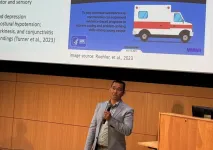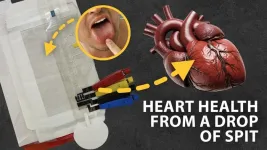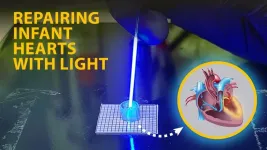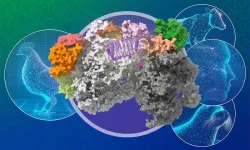(Press-News.org) What time the malaria-bearing mosquito bites you might make a difference
Circadian rhythms appear to influence vulnerability to malaria parasites
A discovery by McGill-affiliated researchers could lead to more effective treatment of malaria and other parasitic diseases.
When mice are infected in the middle of the night with the parasites causing cerebral malaria, the symptoms of the disease are less severe than for those inflected during the day, and the spread of the parasites within the hosts is more limited, research teams from McGill University, the Douglas Research Centre and the Research Institute of the McGill University Health Centre have discovered.
Malaria is a mosquito-borne infectious disease that affects hundreds of millions of people worldwide. It kills more than half a million people each year, most of them children. Cerebral malaria is the deadliest form of the disease.
The researchers’ findings have the potential to lead to new treatment practices based on aligning medication with our circadian rhythms.
How circadian rhythms of host and parasite interact
Circadian rhythms are defined as physiological and behavioral oscillations with cycles of approximately 24 hours, matching the Earth’s rotation, that persist in the absence of environmental timing cues. These rhythms are regulated by a master clock in the brain, as well as by clocks located in most other organs and cell types throughout the organism.
“We explored how the circadian rhythms of both the host and the malaria parasite interact to affect the severity of the disease and the host’s ability to fight off the parasite,” said Priscilla Carvalho Cabral, a recent McGill PhD graduate who carried out the experiments described in two recent studies on the subject.
Nicolas Cermakian, Director of the Laboratory of Molecular Chronobiology, and the corresponding author of the two studies, noted, “The difference in a host’s response to infection depending on the time of day suggests that their circadian rhythms could be influencing the progression of the disease. How such immune clocks impact malaria has not been looked at before.”
An important advance in knowledge
In parasites and their animal hosts, as well as in most living organisms, many bodily functions are under circadian control. It is known, for instance, that the replication of malaria parasites inside the red blood cells of a host follows a daily rhythm. Previous work from the same team has already shown that another serious parasitic disease, leishmaniasis, is affected by host clocks: the time of infection influences the replication of the parasite as well as the immune response to it. In the new studies, the same was found to be true for cerebral malaria.
“Our results represent an important advance in knowledge since many of the mechanisms driving the rhythms in susceptibility to diseases, especially parasitic diseases, remain largely unknown,” says Martin Olivier, Director of the Laboratory for the Study of Host-Parasite Interaction, a professor in McGill’s Department of Microbiology and Immunology and co-author of the two studies.
The studies
“Time of Day and Circadian Disruption Influence Host Response and Parasite Growth in a Mouse Model of Cerebral Malaria,” by Priscilla Carvalho Cabral et al, was published in iScience
DOI: https://doi.org/10.1016/j.isci.2024.109684
“Circadian Control of the Response of Macrophages to Plasmodium spp.-Infected Red Blood Cells,” by Priscilla Carvalho Cabral et al, was published in ImmunoHorizons
DOI : https://doi.org/10.4049/immunohorizons.2400021
END
What time the malaria-bearing mosquito bites you might make a difference
Circadian rhythms appear to influence vulnerability to malaria parasites
2024-08-19
ELSE PRESS RELEASES FROM THIS DATE:
SwRI develops novel DNA-targeting therapeutic screening technique
2024-08-19
SAN ANTONIO — August 19, 2024 —Southwest Research Institute (SwRI) has developed a unique technology to screen new DNA-targeting therapeutics designed to treat cancer and other diseases. Combining SwRI’s 3D drug screening software tool and machine learning techniques, SwRI scientists successfully predicted the DNA binding affinity and cancer cell toxicity for a variety of relevant drug compounds under development.
SwRI expanded the capabilities of its Rhodium™ drug development tool to visualize and rapidly predict how ...
Swiping through online videos increases boredom, study finds
2024-08-19
Swiping through online videos to relieve boredom may actually make people more bored and less satisfied or engaged with the content, according to research published by the American Psychological Association.
The study included seven experiments with a total of more than 1,200 participants from the United States or college students at the University of Toronto. In two baseline experiments, participants switched from one online video to the next when they were bored, and they predicted they would feel less bored by switching videos instead ...
Kelvin K. Droegemeier on ‘Working Toward a Computational Framework to Support Earth System Science and Climate Projection’
2024-08-19
Editor’s note: NCSA is cohosting an International Summit on a Computational System for Frontier Earth System Science and Climate Simulation & Projection September 29 through October 2, 2024 at the University of Illinois Urbana-Champaign.
Toward a Computational Framework for Earth System Models at Kilometer Resolution to Support Earth System Science and Climate Projection
By Kelvin K. Droegemeier, Professor of Atmospheric Science and Special Advisor to the Chancellor for Science and Policy at the University of Illinois Urbana-Champaign
Almost daily, and often without realizing it, we rely upon computers to guide our decisions. Whether finding the fastest ...
National Academy of Medicine selects FAU for substance use, opioid crises collaborative
2024-08-19
As of 2024, approximately 2.7 million Americans aged 12 and older were estimated to have misused prescription opioids in the past year. Moreover, alcohol, cannabis, cocaine, methamphetamines, among other substances, reflect a complex landscape that requires ongoing efforts aimed at prevention, treatment and policy changes to address the various issues associated with each substance.
Florida Atlantic University was recently selected to participate in the National Academy of Medicine’s (NAM) Action Collaborative on Combatting Substance Use Opioid Crises Core Competency Implementation Pilot Project. To improve coordination ...
Study finds potential link between DNA markers and aging process
2024-08-19
Researchers at Weill Cornell Medicine and the epigenetics company TruDiagnostic have uncovered DNA markers associated with retroelements, remnants of ancient viral genetic material, in our genes that act as highly accurate epigenetic clocks predicting chronological age. The results support the idea that certain retroelements in the human genome may be involved in aging.
Retroelements have been known to impact gene regulation, gene expression, genomic stability and the trajectory of various human diseases, but their potential as biomarkers for aging had been largely unexplored.
The ...
Improving access to heart-failure screening with saliva
2024-08-19
DENVER, Aug. 19, 2024 — Heart failure is a leading cause of death worldwide and is especially fatal for people who don’t have access to medical facilities. So, a team of researchers aims to bring heart failure screening from the lab to the home. Their point-of-care electrochemical biosensor prototype, which resembles a see-through lateral flow test for COVID-19, can measure levels of two biomarkers for heart failure in as little as 15 minutes from just a drop of saliva.
Trey Pittman, a graduate student at Colorado State University, will present his team’s research at the fall meeting of the American Chemical Society (ACS). ACS Fall 2024 is a hybrid ...
Expanding a child’s heart implant with light
2024-08-19
DENVER, Aug. 19, 2024 — Children born with defects that impair the heart’s lower chambers undergo a series of invasive surgeries early in life. The first surgery includes implantation of a plastic tube called a shunt to improve blood flow. However, as children grow, the shunt is often replaced to accommodate their changing bodies. Now, researchers have designed a shunt that expands when activated by light. If developed successfully, this device could reduce the number of open-chest surgeries these children receive.
The researchers will present their results at the fall meeting of the American Chemical Society (ACS). ACS Fall 2024 ...
New insights on how bird flu crosses the species barrier
2024-08-19
In recent years, public health measures, surveillance, and vaccination have helped bring about significant progress in reducing the impact of seasonal flu epidemics, caused by human influenza viruses A and B. However, a possible outbreak of avian influenza A (commonly known as ‘bird flu’) in mammals, including humans, poses a significant threat to public health.
The Cusack group at EMBL Grenoble studies the replication process of influenza viruses. A new study from this group sheds light on the different mutations that the avian influenza virus can undergo to be able to replicate in mammalian cells.
Some avian influenza ...
Energy companies pressure landowners into fracking, study shows
2024-08-19
BINGHAMTON, N.Y. -- Energy companies use persistent and personalized pressure to get landowners to give permission for hydraulic fracturing (fracking), and even when landowners decline, companies use legalized compulsion to conduct fracking anyway, according to a new study led by researchers at Binghamton University, State University of New York and UNLV.
“Hydraulic fracturing is a controversial issue, but a lot of the controversy has been focused on the big-picture consequences, for the climate and the economy,” said Benjamin Farrer, lead author and former PhD student at Binghamton University. “One of our hopes for this paper is that it will encourage policymakers ...
UC Irvine team says urban street networks, building density shape severity of floods
2024-08-19
Irvine, Calif., Aug. 19, 2024 — Cities around the globe are experiencing increased flooding due to the compounding effects of stronger storms in a warming climate and urban growth. New research from the University of California, Irvine suggests that urban form, specifically the building density and street network of a neighborhood, is also affecting the intensity of flooding.
For a paper published today in Nature Communications, researchers in UC Irvine’s Department of Civil and Environmental Engineering turned to statistical mechanics ...
LAST 30 PRESS RELEASES:
Billion-DKK grant for research in green transformation of the built environment
For solar power to truly provide affordable energy access, we need to deploy it better
Middle-aged men are most vulnerable to faster aging due to ‘forever chemicals’
Starving cancer: Nutrient deprivation effects on synovial sarcoma
Speaking from the heart: Study identifies key concerns of parenting with an early-onset cardiovascular condition
From the Late Bronze Age to today - Old Irish Goat carries 3,000 years of Irish history
Emerging class of antibiotics to tackle global tuberculosis crisis
Researchers create distortion-resistant energy materials to improve lithium-ion batteries
Scientists create the most detailed molecular map to date of the developing Down syndrome brain
Nutrient uptake gets to the root of roots
Aspirin not a quick fix for preventing bowel cancer
HPV vaccination provides “sustained protection” against cervical cancer
Many post-authorization studies fail to comply with public disclosure rules
GLP-1 drugs combined with healthy lifestyle habits linked with reduced cardiovascular risk among diabetes patients
Solved: New analysis of Apollo Moon samples finally settles debate about lunar magnetic field
University of Birmingham to host national computing center
Play nicely: Children who are not friends connect better through play when given a goal
Surviving the extreme temperatures of the climate crisis calls for a revolution in home and building design
The wild can be ‘death trap’ for rescued animals
New research: Nighttime road traffic noise stresses the heart and blood vessels
Meningococcal B vaccination does not reduce gonorrhoea, trial results show
AAO-HNSF awarded grant to advance age-friendly care in otolaryngology through national initiative
Eight years running: Newsweek names Mayo Clinic ‘World’s Best Hospital’
Coffee waste turned into clean air solution: researchers develop sustainable catalyst to remove toxic hydrogen sulfide
Scientists uncover how engineered biochar and microbes work together to boost plant-based cleanup of cadmium-polluted soils
Engineered biochar could unlock more effective and scalable solutions for soil and water pollution
Differing immune responses in infants may explain increased severity of RSV over SARS-CoV-2
The invisible hand of climate change: How extreme heat dictates who is born
Surprising culprit leads to chronic rejection of transplanted lungs, hearts
Study explains how ketogenic diets prevent seizures
[Press-News.org] What time the malaria-bearing mosquito bites you might make a differenceCircadian rhythms appear to influence vulnerability to malaria parasites





